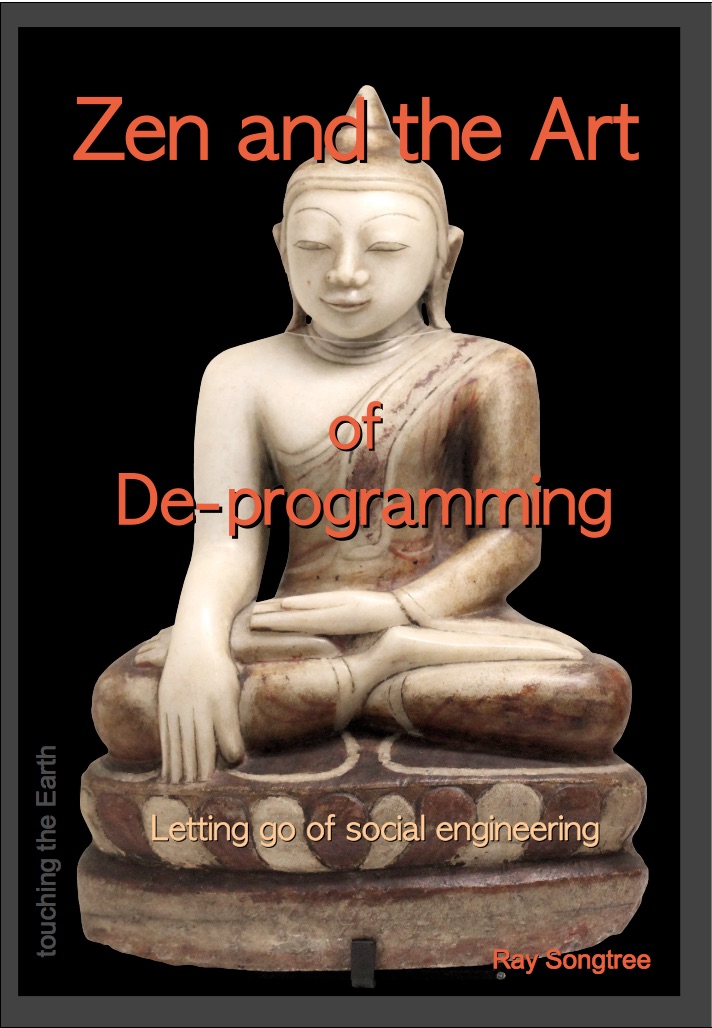Few people understand that “liberal” comes out of…
communism (progressive) a la Jacob Schiff, non-racist ( mono-culture), welfare (equal rations), feminist (Rockefeller agenda), peace (one world government), anti-gun (manageable slaves)
and that conservative is the reaction to all this Roth-efeller, globalist, socialist hegemony. Conservatives want to conserve the natural way which is…
sovereignty (red neck), strong borders (xenophobic), normal sex (homophobic), sexual polarity (misogynist), strong tribes (racist), entrepreneurial (greedy capitalist), local stewardship (anti-environment).
Because I was trained by my liberal parents to put down the latter, I was proud of the former.
Now that I understand who created the former, Zionist Jews and the Rothschild CIA, I have become disgusted with liberal progressive “fair” people who want heaven under Big Brother. Bernie Sanders is example by the way.
I am so conservative that I officially, okay I admit it, am a Luddite.
I have the very anti-social view that we should try to live in harmony with the other 2 million species here on Earth, and that saving them is more important than my toys or pension.
Neo-Luddism
Neo-Luddism or New Luddism is a philosophy opposing many forms of modern technology.[1] The word Luddite is generally used as a derogatory term applied to people showing technophobic leanings.[2] The name is based on the historical legacy of the British Luddites, who were active between 1811 and 1816.[1]
Neo-Luddism is a leaderless movement of non-affiliated groups who resist modern technologies and dictate a return of some or all technologies to a more primitive level.[3] Neo-Luddites are characterized by one or more of the following practices: passively abandoning the use of technology, harming those who produce technology, advocating simple living, or sabotaging technology. The modern Neo-Luddite movement has connections with the anti-globalization movement, anarcho-primitivism, radical environmentalism and Deep Ecology.[3]
Neo-Luddism is based on the concern of the technological impact on individuals, their communities and or the environment,[4] Neo-Luddism stipulates the use of the precautionary principle for all new technologies, insisting that technologies be proven safe before adoption, due to the unknown effects that new technologies might inspire.
Philosophy
Neo-Luddism calls for slowing or stopping the development of new technologies. Neo-Luddism prescribes a lifestyle that abandons specific technologies, because of its belief that this is the best prospect for the future. As Robin and Webster put it, “a return to nature and what are imagined as more natural communities.” In the place of industrial capitalism, Neo-Luddism prescribes small-scale agricultural communities such as those of the Amish and the Chipko movement in Nepal and India[5] as models for the future.
Neo-Luddism denies the ability of any new technology to solve current problems, such as environmental degradation,[5] nuclear warfare and biological weapons, without creating more, potentially dangerous problems.[6][7] Neo-Luddites are generally opposed to anthropocentrism, globalization and or industrial capitalism.
In 1990, attempting to reclaim the term ‘luddite’ and found a unified movement, Chellis Glendinning published her “Notes towards a Neo-Luddite manifesto”. In this paper, Glendinning describes Neo-Luddites as “20th century citizens — activists, workers, neighbors, social critics, and scholars — who question the predominant modern worldview, which preaches that unbridled technology represents progress.”[8] Glendinning then promotes the following principles for the definition of Neo-Luddism:
- “Neo-Luddites are not anti-technology:” Glendinning proposes that Neo-Luddites should only be against specific kinds of technology which are destructive to communities or are materialistic and rationalistic.[8]
- “All technologies are political:” Glendinning argues that Neo-Luddites should question if technologies have been created for specific interests, to perpetuate their specific values (short-term efficiency, ease of production and marketing, profit).
- “The personal view of technology is dangerously limited:” Glendinning thinks that the secondary aspects of the technology (social, economic and ecological implications) need to be examined before adoption of technology into our technological system, and not personal benefit.
Vision of the future without intervention
Neo-Luddism often establishes stark predictions about the effect of new technologies. Although there is not a cohesive vision of the ramifications of technology, Neo-Luddism predicts that a future without technological reform has dire consequences. Neo-Luddites believe that current technologies are a threat to humanity and to the natural world in general, and that a future societal collapse is possible or even probable. According to Sale, “The industrial civilization so well served by its potent technologies cannot last, and will not last; its collapse is certain within not more than a few decades.”.[9] Neo-Luddite Ted Kaczynski predicted a world with a depleted environment, an increase in psychological disorders, with either leftists who aim to control humanity through technology, or technology directly controlling humanity.[10] These predictions include changes in humanity’s place in the future due to replacement of humans by computers, genetic decay of humans due to lack of natural selection, biological engineering of humans, misuse of technological power including disasters caused by genetically modified organisms, nuclear warfare, and biological weapons; control of humanity using surveillance, propaganda, pharmacological control, and psychological control; humanity failing to adapt to the future manifesting as an increase in psychological disorders, widening economic and political inequality, widespread social alienation, a loss of community, and massive unemployment; technology causing environmental degradation due to shortsightedness, overpopulation, and overcrowding.[5][11]
Stephen Hawking, a famous astrophysicist, when interviewed expressed a concern for the future impacts of capitalism and technology:[12]
If machines produce everything we need, the outcome will depend on how things are distributed. Everyone can enjoy a life of luxurious leisure if the machine-produced wealth is shared, [in his utterly ignorant, ecologically illiterate view of endless consumerism] or most people can end up miserably poor if the machine-owners successfully lobby against wealth redistribution. So far, the trend seems to be toward the second option, with technology driving ever-increasing inequality.
Types of intervention
In 1990, attempting to reclaim the term ‘luddite’ and found a unified movement, Chellis Glendinning published her “Notes towards a Neo-Luddite manifesto”. In this paper, Glendinning proposes destroying the following technologies: electromagnetic technologies (this includes communications, computers, appliances, and refrigeration), chemical technologies (this includes synthetic materials and medicine), nuclear technologies (this includes weapons and power as well as cancer treatment, sterilization, and smoke detection), genetic engineering (this includes crops as well as insulin production).[8] She argues in favor of the “search for new technological forms” which are local in scale and promote social and political freedom.
[I, Ray Songtree, go further. I say the ancient way worked and was sustainable and empowering, and that a return to pre-industrial, that is stone age, lifestyle is the only lifestyle the Earth will support for millions of more years.]
In “The coming revolution”, Ted Kaczynski outlined what he saw as changes we are going to have to make in order to make society functional, “new values that will free them from the yoke of the present technoindustrial system”, including:
- Rejection of all modern technology — “This is logically necessary, because modern technology is a whole in which all parts are interconnected; you can’t get rid of the bad parts without also giving up those parts that seem good.”
- Rejection of civilization itself
- Rejection of materialism and its replacement with a conception of life that values moderation and self-sufficiency while deprecating the acquisition of property or of status.
- Love and reverence toward nature or even worship of nature
- Exaltation of freedom
- Punishment of those responsible for the present situation. “Scientists, engineers, corporation executives, politicians, and so forth to make the cost of improving technology too great for anyone to try”
Origins of contemporary critiques of technology in literature
According to Julian Young, Martin Heidegger was a Luddite in his early philosophical phase and believed in the destruction of modern technology and a return to an earlier agrarian world.[13] However, the later Heidegger did not see technology as wholly negative and did not call for its abandonment or destruction.[14] In The Question Concerning Technology (1953), Heidegger posited that the modern technological “mode of Being” was one which viewed the natural world, plants, animals, and even human beings as a “standing-reserve” — resources to be exploited as means to an end.[14] To illustrate this “monstrousness”, Heidegger uses the example of a hydroelectric plant on the Rhine river which turns the river from an unspoiled natural wonder to just a supplier of hydropower. In this sense, technology is not just the collection of tools, but a way of Being in the world and of understanding the world which is instrumental and grotesque. According to Heidegger, this way of Being defines the modern way of living in the West.[14] For Heidegger, this technological process ends up reducing beings to not-beings, which Heidegger calls ‘the abandonment of Being’ and involves the loss of any sense of awe and wonder, as well as an indifference to that loss.[14]
One of the first major contemporary anti-technological thinkers was French philosopher Jacques Ellul. In his The Technological Society (1964), Ellul argued that the rationality of technology enforces logical and mechanical organization which “eliminates or subordinates the natural world.” Ellul defined “technique” as the entire totality of organizational methods and technology with a goal toward maximum rational efficiency. According to Ellul, technique has an impetus which tends to drown out human concerns: “The only thing that matters technically is yield, production. This is the law of technique; this yield can only be obtained by the total mobilization of human beings, body and soul, and this implies the exploitation of all human psychic forces.”[15] Another critic of political and technological expansion was Lewis Mumford, who wrote The Myth of the Machine. The views of Ellul influenced the ideas of the infamous American Neo-Luddite Ted Kaczynski, who engaged in a nationwide mail bombing campaign, killing three people and injuring 23 others. The opening of Kaczynski’s manifesto reads: “The Industrial Revolution and its consequences have been a disaster for the human race.”[10] Other philosophers of technology who have questioned the validity of technological progress include Albert Borgmann, Don Ihde and Hubert Dreyfus.[5][16]
Movement
Contemporary Neo-Luddites are a widely diverse group of loosely affiliated or non affiliated groups which includes “writers, academics, students, families, Amish, Mennonites, Quakers, environmentalists, “fallen-away yuppies,” “ageing flower children” and “young idealists seeking a technology-free environment.”[9] Some Luddites see themselves as victims of technology trying to prevent further victimization (such as Citizens Against Pesticide Misuse). Others see themselves as advocates for the natural order and resist environmental degradation by technology (such as Earth First!).[9]
One Neo-Luddite assembly was the “Second Neo-Luddite Congress”, held April 13–15, 1996 at a Quaker meeting hall in Barnesville, Ohio. On February 24, 2001, the “Teach-In on Technology and Globalization” was held at Hunter College in New York city with the purpose to bring together critics of technology and globalization.[9] The two figures who are seen as the movement’s founders are Chellis Glendinning and Kirkpatrick Sale. Prominent Neo-Luddites include educator S. D. George, ecologist Stephanie Mills, Theodore Roszak, Scott Savage, Clifford Stoll, Bill McKibben, Neil Postman, Wendell Berry, Alan Marshall and Gene Logsdon.[5][9] Postman, however, did not consider himself a Luddite and loathed being associated with the term.
Relationship to violence and vandalism
Some Neo-Luddites use vandalism and or violence to achieve social change and promote the cause.[17]
In May 2012, credit for the shooting of Roberto Adinolfi, an Ansaldo Nucleare executive, was claimed by an anarchist group who targeted him for stating that none of the deaths following the 2011 Tōhoku earthquake and tsunami were caused by the Fukushima Daiichi nuclear disaster itself:
Adinolfi knows well that it is only a matter of time before a European Fukushima kills on our continent […] Science in centuries past promised us a golden age, but it is pushing us towards self destruction and slavery […] With our action we give back to you a small part of the suffering that you scientists are bringing to the world.[18]
Ted Kaczynski, [wikipedia lies a lot… Ted Kaczynski was a false flag attack] also known as the Unabomber, initially sabotaged developments near his cabin but dedicated himself to getting back at the system after discovering a road had been built over a plateau he had considered beautiful. Between 1978 and 1995, Kaczynski engaged in a nationwide bombing campaign against modern technology, planting or mailing numerous home-made bombs, killing three people and injuring 23 others. In his 1995 manifesto, Industrial Society and Its Future,[10] Kaczynski states:
The kind of revolution we have in mind will not necessarily involve an armed uprising against any government. It may or may not involve physical violence, but it will not be a POLITICAL revolution. Its focus will be on technology and economics, not politics.
[In other words, Kaczynski was created by CIA to make an enemy of anyone who resisted “progress.”]
Kirkpatrick Sale says Neo-Luddites are not motivated to commit violence or vandalism.[19] The manifesto of the ‘Second Luddite Congress’, which Kirkpatrick Sale took a major part in defining, attempts to redefine Neo-Luddites as people who reject violent action.[9]





Strong Tribe sentiment, a slippery slope.. often end up thinking of others as Untermensch.. A mentality that’s easy to cultivate, politically effective etc. I see it clear as Day. Most people form part of their national or tribal solidarity by having others to look down on.. When I lived in Puerto Rico they talked down about Dominican Republicans. When I visited D.R. they talked down about Haitians. We ego trip on what we have better.. The ‘Look at me!’, aren’t you envious!, National attitude, seems modern and to be a direct result ‘product’ of capitalism… Here on the farm we hosted two men from Vanuatu. Joe-el, and Oi-peel for 6 weeks, It warmed my heart to meet some fellas who had justifiable pride in their self sufficiency and culture. If you haven’t been to Vanuatu I’d recommend it, from what I know it’s bit less developed than Fiji over there.
It is either empire or tribes with sovereignty.
Once metal runs out and we are back to stone age, no more empire. Nothing wrong with we and them. We defines we. Puerto Ricans don’t want to be like Dominican Republicans and they naturally should draw distinctions and shun what is alien to them.
Endless change means no borders are static and there will never be stasis or “peace”. Get used to it!
But you have been indoctrinated in a new world order religion that judges nature as inferior. Who the F are you or I to judge what is ancient and worked for 2 million species?
The slippery slope is thinking there is such a thing as progress. Progress is double speak for temporarily replacing natural order with an alien order, which leaves the planet dead, every time, and that is the lifestyle of “them.” They introduced globalism and “one humanity” monotheism to get us to the slave society that will be genderless, test tube, and maintain THEIR AI for efficient extraction. Alien – literally, ET, extra dimensional. See book, The Day After Roswell to discover where modern tech came from. I have corroborated the back engineered space craft story.